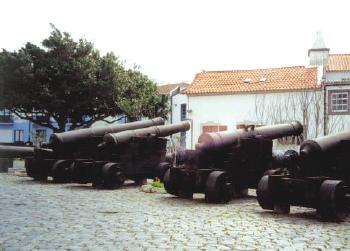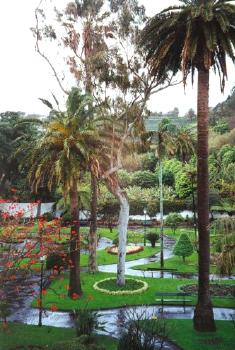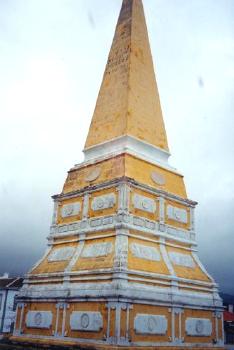Terceira, The Azores (Açores), Portugal (March 2001)

Angra do Heroísmo (map) has been important to Portuguese history since the 16th Century. Traditionally it provided a convenient central landing point in the middle of the Atlantic Ocean. Here, mariners could rest, resupply and shelter their ships as they plied the trade routes between Europe, Africa and the Americas. That lasted until the advent of steamships in the 19th Century.
Angra in this context means “cove” in Portuguese. Thus it referred to the adjacent shoreline where ships anchored. Then the “heroism” part came from Maria II. She granted the title upon the town in the early 19th Century for its bravery and support during the Liberalism movement.
The United Nations Educational, Scientific and Cultural Organization (UNESCO) added the town’s Central Zone to its World Heritage Center list in 1983 based on historical and architectural significance. A key part of that, the Museum of Angra do Heroísmo, formerly the Convento de São Francisco (a convent), provides an interesting place to stop on a walk through town.
It’s probably easiest to see the town on foot. The central zone is relatively compact and sites worth visiting are within close proximity.
Coastal Fortifications

These cannons stood outside the same museum along a cobblestone terrace. They symbolized the historical strategic importance of the town. It needed strong defenses to control such a vital trade link between the Old World and the New World.
Jardim Público

The Jardim Público, or “Public Garden” was also once part of the Convento de São Francisco. Today the public can enjoy its beautifully maintained spaces.
We walked through the gardens early one morning. Busy workers swept leaves and washed the paths. Everything seemed ready to start a perfect day.
Alto da Memória

We wandered up to one of the higher points in town to the Alto da Memória. This pyramid honored the arrival of King D. Pedro IV to Terceira as the constitutional army prepared to move forward against mainland Portugal in 1832. This same spot also marked the location of the first fortress in the Azores, the Castle of Moinhos.
However if those are not enough reasons to trudge uphill to this point, it does offer excellent views of the city.

Leave a Reply